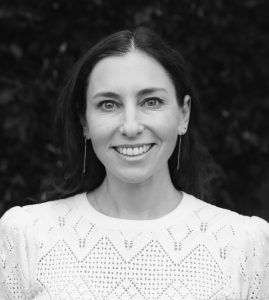While traveling around Latin America as a college student, Erica Pollack, MD, was more than a tourist. Already interested in a medical career, she was noticing the differences between American medicine and what was available in less-developed countries.

“I had a sense from that experience about the health discrepancies and the privilege we have here,” said Dr. Pollack, an associate professor of radiology at the University of Colorado School of Medicine. “I was fortunate to see that before I started medical school, and it was really formative for me.”
Before she completed her radiology residency and breast imaging fellowship at Columbia University Medical Center, Dr. Pollack had a global perspective on health care. Her experiences in Central and South America led her to get involved with RAD-AID International, a nonprofit organization that works to improve and optimize access to medical imaging and radiology in low-resource regions of the world.
Dr. Pollack began working with RAD-AID in 2011 as a global health fellow in India to help launch its program there.
“I had always been interested in this type of work,” she said. “I envisioned my career in radiology including international work in global health.”
RAD-AID partnered with the teaching hospital PGIMER and Philips Healthcare to provide a van that traveled across rural parts of northern India to offer mammograms, cervical cancer screenings, and bone density screening.
“It was a one-stop shop for women’s healthcare,” Dr. Pollack said. “Patients then had a direct pathway for follow-up and care. That’s what had been missing from similar programs.”
Moving Up in RAD-AID
Her involvement with RAD-AID grew when she was named program manager for India in 2014. RAD-AID’s membership and reach expanded tremendously over the next 10 years, and she became the organization’s first director of breast imaging in 2017.
Today, RAD-AID’s efforts in breast imaging span five continents and a dozen countries. The team celebrated a milestone last year when they successfully launched the first breast fellowship program in Ghana in partnership with the Ghana Society of Radiologists. This effort was spearheaded by RAD-AID program manager Melissa Durand, MD, and as a result, there should be three fellowship-trained breast radiologists in the West African country next year.
“We help our partners become more efficient and grow their own programs so they can reach patients,” Dr. Pollack said.
RAD-AID receives requests for assistance and partners with groups like the World Health Organization to determine where its help is most needed. For perspective, Dr. Pollack is one of seven attending breast radiologists at the University of Colorado. Kenya, a country of 54 million, has fewer than five. Clearly, there’s a problem of representation, costing lives in the process.
“Instead of seeing women come in with metastatic disease at the time of presentation, our goal is to diagnose women at a curable and more treatable stage of breast cancer,” she said. “That requires increasing awareness so that women know that they should come in when they’re symptomatic, increasing availability of screening and diagnostic services, and creating a pathway for all women to receive treatment.”
Recently, much of her work has been performed remotely even though she enjoys traveling to share the importance of radiology.
“I have young kids, so I have not traveled as much and, of course, I have a clinical job,” Dr. Pollack said. “A lot of my relationships have been more online and through Zoom meetings.”
As RAD-AID’s director of breast imaging, she works with the organization’s country leaders to implement and support diagnostic and interventional breast imaging programs. She collaborates with the RAD-AID breast imagers and mammographers to establish best practices for efficient use of services in low-resource areas.
“We work as a group and partner with the country program directors,” she said. “The amount of time on each specific country program varies month by month. I spend at least 10 hours a week (working for RAD-AID). It’s an absolute privilege and a joy in my life.”
Teaching Others Her Worldview
As an associate residency program director at the University of Colorado, Dr. Pollack is helping inspire a new generation of physicians through this global health program. Her goal is to train physicians who understand what she learned during her undergraduate days: the importance of world health equity.
“The University of Colorado administration has been really supportive,” she said. “They have let me build a program for the residents that lets me combine my interests of global health and teaching.”
The program allows residents to be exposed to global health gradually and ultimately to participate in a department-sponsored trip to Kathmandu, Nepal, to work with colleagues at Tribhuvan University Teaching Hospital.
Eduardo Bent Robinson, MD, became a program manager in Nepal for RAD-AID while serving as one of Dr. Pollack’s residents.
“Under the guidance of Dr Pollack’s leadership at the University of Colorado, I have had the opportunity to learn, grow, and expand my knowledge about the various avenues through which we can give back to communities in need,” he said. “The inaugural trip to Nepal was nothing short of transformative, broadening my horizons and deepening my commitment to making a positive impact in healthcare worldwide.”


